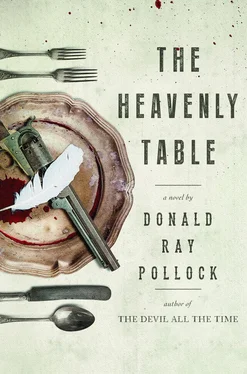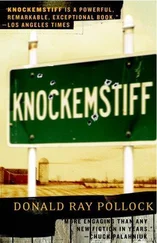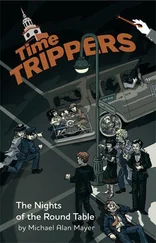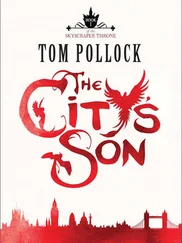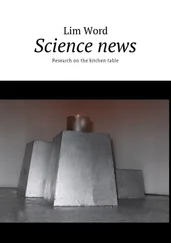Eventually, Wesley opened his right eye and looked over, saw his lieutenant. In a voice a bit slurry with painkillers, he said slowly, “First darn time I was ever drunk in my life and look what happened.”
“Just so you know,” Bovard said, “I heard they arrested the man who attacked you.”
“Aw, I should have left him alone, him being a preacher and all, but he just kept on about…Heck, I can’t remember now. Something to do with the war, I think.”
“Has anyone been around to talk to you yet?”
“No, sir, I ain’t heard nothing other than I lost my eye.”
Bovard felt he should say something encouraging, but what could that possibly be? Disappointment filled the room. No chance for a glorious death now, the poor kid. He imagined Wesley going back to whatever dismal farm or hamlet he had come from once he was released from the brig. “I’ll ask ol’ Lloyd Beavers about hiring you on at the granary,” his father would tell him; and a few months later he’d marry some wide-hipped local girl, sealing his fate forever, though, of course, the boy wouldn’t think of it like that, at least not for the first couple of weeks. Bovard, however, could see it all: a month or two of wedded bliss wiped out in seconds by the first serious spat over something as trivial as a burned meatloaf; and then the years passing by one after another, the struggle to make ends meet, the burden of a passel of brats to feed and clothe, the inevitable decline. A lifetime after the war has ended, Wesley sitting on his stoop, his black hair turned gray, worn out with niggling worries and constant back pain and the same old same old. He clutches a brown bottle of home brew in his knotty, arthritic hand. He looks toward the horizon, the quiet evening surrounding him in a lonesome, regretful sadness. His children now gone, his wife suffering from yet another ailment. He hears her inside the house, moving about slowly, muttering to herself. His hand reaches up and touches the black eye patch. Back when it happened, everyone had said he was lucky that he didn’t have to go fight. But now, looking around his tiny square of yard at the clumps of dead grass and the old, weather-cracked tire swing hanging in the tree, he…
“Am I gonna go to prison?” Wesley suddenly said.
Jerked out of his reverie, Bovard cleared his throat. “Well, I’m not sure, but what you did, it’s considered a serious offense.”
“What if you talked to them for me? I swear the only reason I took off was my girlfriend sent me a letter saying she was gettin’ married.”
“I’m sorry, Wesley, but I’m afraid that wouldn’t do any good.”
“No, probably not.”
“What about your family?” Bovard said. “Would you like for me to contact them, let them know what’s happened?” The nurse, a crabby, thin-lipped woman, came back and looked in at them, then went away.
“Oh, no, sir, I’d rather you didn’t. Truth is, the day I signed up was the proudest my old man’s ever been of me, and I don’t want to ruin that quite yet.”
“I understand,” Bovard said, standing up to leave. “Well, good luck.”
“I still can’t believe she’s gettin’ hitched to ol’ Froggy Conway,” Wesley said bitterly, a trace of anger starting to surface through the dope haze. “I swear to God, sir, he’s damn near as old as my granddaddy.”
“Look, I know it might be hard to imagine now, but I’d wager one of these days you’ll see it was the best thing that could have happened.”
“Well, you might be right about that. Truth is, I ain’t had much feeling for her ever since I got in her knickers last spring. For some reason, I thought it would be more fun than it was. But Froggy Conway? I’ll be the joke of the town when I go back home. Jesus. The sonofabitch looks like a hoptoad.” He bit his lip to keep from crying and looked toward the window. Just then, he almost wished the old preacher had killed him last night. There weren’t but four hundred people in Veto, which meant that he’d see her and Froggy every time he turned around. And that wasn’t the worst of it; even if people forgot Mary Ann had cheated on him, they would never forget that he’d deserted his post. Maybe he could move away, he thought, find a job in Pomeroy or Gallipolis, some town where people didn’t know him. He was getting ready to ask Bovard what he thought he should do when he realized the man was gone. Might as well get used to it, Wesley thought sadly. Nobody wanted anything to do with him now, not even his lieutenant.
AROUND FIVE O’CLOCK that evening, Chimney completed his driving lesson and took Triplett back to his office. The salesman climbed out of the car, his stomach in worse shape than ever. The boy was probably the most reckless driver he had ever met, but at the same time he did have a knack for it. At least a dozen times Triplett had thought they were goners, but somehow the little sonofabitch always managed to pull off another miracle. Triplett tore off his goggles and duster and sucked some air down into his lungs. He’d been so tense for the last hour he’d barely been able to breathe. “Where would I find me an outfit like the one you’re wearing?” Chimney asked him.
“Go to Wissler’s down on Second Street,” Triplett said, still a little dizzy. “That’s where I buy all my gear.”
Chimney made it to the hardware store just before they closed. He bought a pair of tinted goggles and tight leather gloves and a tan-colored duster, then drove back to the hotel and spent ten minutes trying to park along the curb between a roadster with a flat tire and a wagon filled with crates of apples. He rushed upstairs and washed the dust off his face and hands and combed his hair, then put on his new driving ensemble and admired himself in the mirror. Locking the door to his room, he walked past the ink-stained desk clerk and headed for the park.
Cane was seated on a wooden bench by the pond watching Cob throw bits of bread out onto the water for the ducks. He was mulling over the last scene he had read in Richard III, in which the cripple has two nephews drowned in a wine cask. Because this Shakespeare fellow used so many words he’d never heard before, it was hard to figure out exactly what was going on at times; but he was thinking Chimney would probably love a story filled with such meanness when he looked up and saw him striding toward them in his new clothes: the striped pants and purple shirt bright against the tan duster, the goggles covering half his face, the derby sitting atop his head like a black egg.
“So you got it?” Cane said. “The automobile?”
“I did. A Ford. ‘Coop,’ the man called it. The sonofabitch will go thirty-five miles an hour!”
“Where is it?” Cane asked, as Cob slung the rest of the bread into the pond, then walked over and stood silently looking at his younger brother.
“Parked up in front of the hotel. I been driving it around all afternoon with the salesman. Startin’ it up’s a little tricky, but I almost got the hang of it.”
“Good,” Cane said. “What’d ye pay for it?”
“Two-fifty.”
“You look funny,” Cob spoke up.
“Fuck you,” Chimney said. “This is what you wear when you’re operatin’ an automobile. Course, you wouldn’t know nothin’ about that. Shit, you can barely stay on a horse.”
“Well, that might be,” Cob said, “but me and Tom’s got the biggest dern ham you ever seen up in our room.”
“You watch out he don’t try to molest it while you’re sleeping.”
“Huh?” Cob said.
“Never mind,” Chimney said. He took the goggles off and stuck them in the pocket of the duster, then sat down on the bench. “Found out about some whores, too. All ye do is get in a taxi and he’ll take you right to ’em.”
Читать дальше
